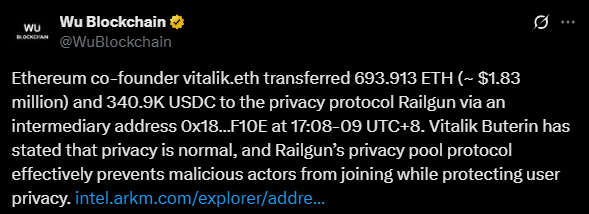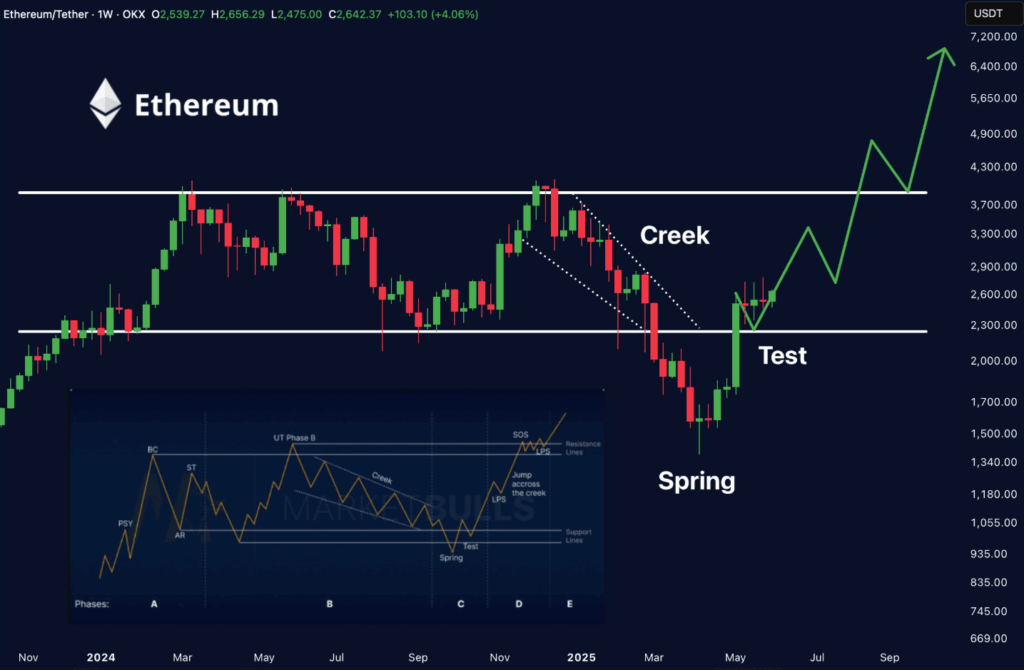Key Insights:
- Vitalik Buterin transfers 693.91 ETH and 340.9K USDC to privacy protocol Railgun.
- Privacy advocacy continues as Buterin supports on-chain confidentiality tools.
- Ethereum sees major spike in user activity with Layer 2 growth and technical breakout potential.
Vitalik Buterin has moved $1.83 million worth of assets to the privacy-focused protocol Railgun, sparking renewed attention on blockchain privacy.
The transfer, which included 693.91 ETH and 340,931 USDC routed through a linked intermediary wallet, was consistent with Buterin’s longstanding views on transaction confidentiality.
As this move came, Ethereum ecosystem activity has spiked to record highs, with over 17.4 million active addresses interacting in a single week.
Buterin’s action represents a growing schism between centralized oversight and user-driven privacy innovation in crypto infrastructure.
Buterin Reinforces Privacy Commitment With On-Chain Transfer
Ethereum’s co-founder continues to push privacy as a core value via real blockchain activity. On June 4, Buterin moved nearly 694 ETH and over 340K USDC to Railgun, a smart contract protocol for private transactions.
The original sender was shielded using address 0x18…F10E which was used as an intermediary to make the transfer.
Around $240,931 in USDC came from the Moloch Foundation, which backs Ethereum ecosystem development. Now, the assets are inside Railgun’s privacy pool, a protocol for confidential token transfers via zero-knowledge proofs.
The action comes after a number of public comments from Buterin in defense of the use of privacy tools in open financial systems.

Unlike past solutions like Tornado Cash, Railgun includes protective features to mitigate the risk of malicious activity. It screens wallet participants while keeping user identities private, but not anonymous.
Buterin has always argued that people should have basic financial privacy without surveillance. That principle is reflected in his recent transfer by direct protocol usage.
The crypto community reacted to the transaction quickly, viewing it as an unequivocal endorsement of encrypted transaction layers.
Praise for transparency of intent, speculation about future regulatory scrutiny and more were discussed across social platforms.
Buterin’s action comes as governments clamp down on anonymous tools and puts privacy back in the spotlight for blockchain innovation.
Ethereum Ecosystem Sees Record Weekly Engagement and Layer 2 Growth
As privacy protocols gain traction, so has Ethereum’s overall network usage. GrowThePie data shows that Ethereum hit 17.4 million active addresses in a week, a 16.95% increase. Gas fees drop, Layer 2 networks expand and Ethereum becomes more accessible to users which brings this spike.

Layer 2 dominance rose 18.43% week over week to 7.55x and the number of addresses interacting with multiple chains stayed flat at 590,403.
These are metrics of growing adoption and confidence in Ethereum’s scaling roadmap. Now, with lower transaction costs and broader interoperability, more real-world usage is coming back on-chain.

Bullish technical structure is also forming on Ethereum’s price chart and weekly engagement is spiking in line with this.
Analysts say the pattern is a Wyckoff Spring and Test, with a projected breakout to levels above $4,300.
This setup means that Ethereum has finished its corrective phase and could start a new bullish trend if market conditions continue.
Market Watches Vitalik’s Moves as Privacy and Regulation Collide
Buterin’s transaction comes as regulators are increasingly scrutinizing privacy tools, including Tornado Cash, which has been cracked down on.
But Railgun has a different model with privacy layers built in and anti-abuse checks, which may be more attractive to legal frameworks. But high-profile figures using privacy protocols could still attract regulatory attention.
Buterin has always been a privacy advocate, arguing that privacy is normal and is something blockchain users should expect. He thinks that people shouldn’t have to expose their whole history to the public or to centralized parties in a financial transaction.
It has been stated in blogs and speeches and now is being realized through real usage of technologies that are in line with those values.
While the momentum was positive, some community members were worried about backlash. Fear of renewed attention on privacy may pressure protocols like Railgun.
However, supporters say that innovation in this area is essential to maintaining decentralization and user autonomy. Buterin’s transfer for now is a strong statement of support for blockchain privacy and individual sovereignty.
